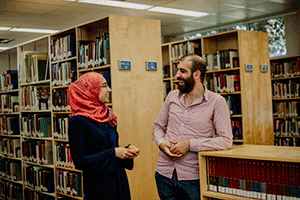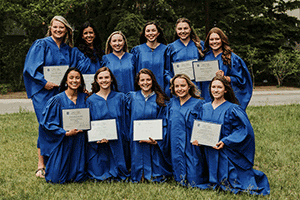Ready to learn more?
Get all the details straight to your inbox!

Luther College offers Bundles programs that group together first-year students and classes to give you a great start and help ease the transition from high school to university.

The Luther Library has over 24,000 items in its collection, 5,000 books checked out per year, and 7,000 students who come through its door per month.

The priority deadline for academic application is March 15. To book a personalized enrolment counselling appointment, contact our Recruitment Office at 1-306-206-2117.

Every degree program at Luther College offers a study abroad option and an optional experiential learning component where you gain real world experience and get paid while going to school!

Eating better means studying better. The Luther Cafeteria offers fresh, healthy, nutritious meals seven days a week with a self-serve “all-you-care-to-eat” concept students prefer.

Luther College students are U of R students and receive all the same benefits. Upon graduation you will receive a U of R degree.

Luther College is a great choice for high school to university transition. Enjoy all the benefits of a larger campus, without feeling lost in the crowd. Our community is full of caring mentors and peers to ensure a positive student experience.

Luther College is recognized for its high standards of teaching, focused research, and one-on-one academic advising. We value and protect this heritage of excellence in scholarship, freedom of inquiry, and faithful seeking after truth.
Get all the details straight to your inbox!
By William A Stahl
Equality has always been a dangerous idea. Since ancient times, those who have privileged positions in a hierarchy have always claimed that their wealth and power was deserved. The specific justifications change from time to time, but whether oligarchs, nobles, aristocrats, or tycoons, their arguments are always the same. We are better, they assert, whether that means “more virtuous,” “more holy,” “more civilized,” or “harder working.” Equality challenges hierarchy by saying all people have the same value.
More than two centuries ago, the American and French Revolutions ushered in the modern political era by promising that all people were equal. Of course, neither delivered on the promise—women were still excluded, Afro-Americans were still enslaved, workers were oppressed, religious and ethnic minorities were discriminated against. But having once promised equality it was hard to close the door again, and over the past two centuries demands for equality have been the rallying cry for movements for change.
This is the context for Lori Beaman’s discussion of deep equality. In the English-speaking world we have moved slowly and painfully from witch hunts, heresy trials and religious wars to “toleration” and—in Canada—to “multiculturalism” and “reasonable accommodation.” Now, Beaman argues, it is time to take the next step. I agree. But as Beaman admits, the “idea of deep equality is still a bit nascent.” I wonder if her formulation goes far enough?
Much of the discussion about equality in North America over the past few decades has centred upon the dilemma of equality as sameness versus equality as recognition of difference. Unfortunately, this debate has not been resolved—and perhaps cannot be resolved—because it is focused on identity. In other words, it has become a debate about how do we relate to you. But if the debate is formulated this way it ironically recreates the same conditions for which toleration and reasonable accommodation are criticized. Identity is about drawing boundaries, between me and you, between us and them (cf. Mol, 1976). The act of drawing a boundary delineates a centre or core for ourselves and the line beyond which anything else is “not us.” Identity boundaries are flexible, but only within certain limits. So to focus questions of equality on identity alone renders the question, by its very nature, insoluble.
Now of course, identity is important. But some discussions of multiculturalism and equality tend to treat groups as unitary and their boundaries as unproblematic. If we want to advance our understanding (and practice) of equality we will need to also consider the dimensions of solidarity and legitimacy.
Central to the question of solidarity is the phenomenon of cross-cutting loyalties—people are members of more than one group and therefore their identity can be pulled in more than one direction. Which loyalties become the most salient at any given moment is a political question. For example, during the depression of the 1890s, the Populist movement in the American South united poor whites and blacks behind a political program on the basis that they were all poor (Abrams, 1969). The southern elites successfully fought back by passing the Jim Crow segregation laws which split poor whites away from the Populists on the basis that both they and the elites were white. In this case the movement for equality was defeated, but defeat was not inevitable.
One way of building solidarity is to find a basis for legitimate authority which transcends more parochial boundaries. In other words, one path to equality is to find a “higher” loyalty that members of all groups can share. An example can be found in the debates over Canadian Confederation. In the 1860s the people who live in what is now Canada did not like each other very much. English and French hated each other, Canadians and Maritimers had little in common, Protestants and Catholics rioted in the streets. The one thing they did share was loyalty to the Crown. As George Etienne Cartier stated in the Confederation Debates (Canada, 1865, 60), French Canadians were loyal to the Queen, and because they had repeatedly proven that loyalty upon the battlefield, they could be good Canadians without having to give up anything of who they were. [Attitudes in Quebec today are very different, but that is another story]. Confederation “worked” because it was a political nationality and not one grounded in culture. What this means for deep equality is that it may in fact be possible to transcend cultural and religious differences by going beyond them to forge a new “higher” loyalty that goes beyond the paradoxes of sameness and difference.
Finally, is discussion of deep equality in terms of religion and culture too restrictive? There is no doubt that economic inequality is rapidly increasing in Canada as the rich get richer and everybody else marks time or loses ground. Equality by very its nature challenges hierarchy. I do not think we can seriously consider deep equality for religious and cultural groups if the rest of society is ever more hierarchical. Democracy requires equality. Religious and cultural equality requires economic equality.
Abrams, Richard M. (ed.), 1969, Issues of the Populist and Progressive Eras, 1892-1912, New York: Harper and Row.
Canada, 1865, Parliamentary Debates on the Subject of the Confederation of the British North American Provinces, 8th Provincial Parliament of Canada. Quebec: Hunter, Rose & Co., Parliamentary Printers.
Mol, Hans, 1976, Identity and the Sacred, Agincourt, Canada: The Book Society of Canada, Ltd.